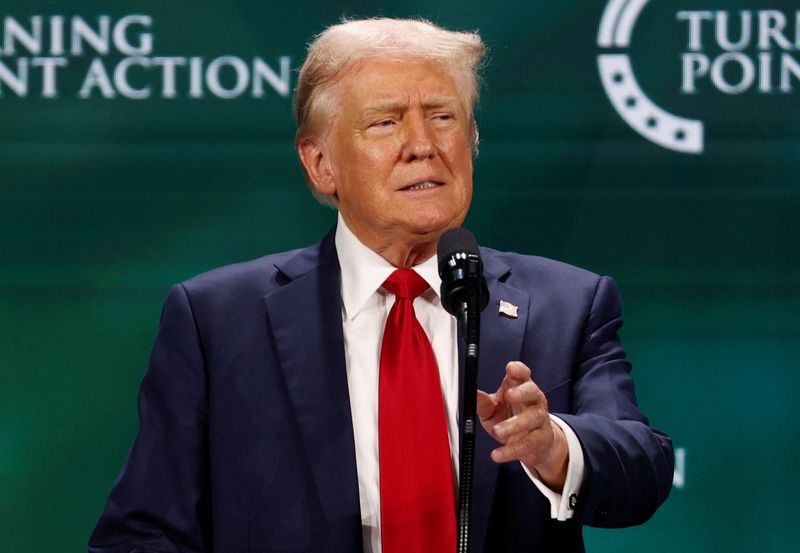By James Oliphant and Tim Reid
WASHINGTON (Reuters) - Republican presidential candidate Donald Trump's campaign will launch a $10 million advertising blitz in six battleground states this week as it tries to counter a surge of voter enthusiasm and donations for his Democratic rival Kamala Harris.
It is Trump's biggest ad buy since January, when he was fighting off Republican rivals for the party's nomination. Trump's campaign did not respond to requests for comment, but the blitz comes as Harris’ candidacy has changed the race.
Since President Joe Biden dropped out last week and endorsed Harris, she has rapidly consolidated support within the Democratic Party and from big-money donors. She has also sparked a newfound energy among groups such as young voters that Biden had been struggling to win over.
After months of attacks on Biden’s fitness for office, Trump's campaign has had to pivot to find a new message to use against the younger and more dynamic Harris, 59, less than 100 days until the Nov. 5 election.
On Monday, Trump, 78, released an ad on his Truth Social platform using Harris’s own words from old interviews, campaign events and debates to try to portray her as an extreme liberal out of touch with everyday Americans, particularly in the Rust Belt.
In response, Harris accused the Trump campaign of lying about her record.
"Vice President Harris has been a key leader in working across the aisle to pass the Biden-Harris administration’s historic, popular agenda," said Harris spokesperson Sarafina Chitika.
Since she emerged as her party's candidate, Harris has focused on Trump's felony convictions in a New York hush-money trial and the other criminal charges he faces, and portrayed him as responsible for a wave of anti-abortion measures in Republican-led states around the country.
A super PAC supporting Trump, MAGA Inc., kicked off a parallel ad blitz when it said last week it will spend $32 million in three states with new ads criticizing Harris.
Unlike presidential campaigns, there are no limits on donations to super PACs, meaning they often have more money to spend. But they are not permitted to coordinate with campaigns on strategy.
Future Forward, a Democratic super PAC, said it is launching a $50 million effort to back Harris in Arizona, Georgia, Michigan, Nevada, Pennsylvania and Wisconsin, the six states seen as pivotal to deciding the election because their voting preferences can swing either way.
Harris’ campaign said on Sunday that it raised $200 million in new campaign funds last week.
While Harris is well known, her policy positions are not.
“She has a second chance to make a first impression,” said pollster Evan Roth Smith of the Democratic polling firm Blueprint.
But the danger for Harris lies in whether the Trump campaign can define her in voters' minds before her campaign can make it to the airwaves, he said.
Brian Schimming, chair of Wisconsin's Republican Party, said Republicans are moving to do just that.

"It's about letting people know that if you didn't like Joe Biden, you're really not going to like Kamala Harris," he said.
As a candidate for president during the 2020 election, Harris adopted several left-leaning positions on immigration and healthcare in a bid to court liberals. But as Biden’s vice president, she has has stayed true to the administration’s more pragmatic policies.